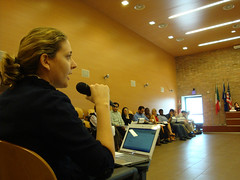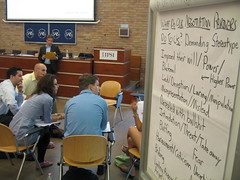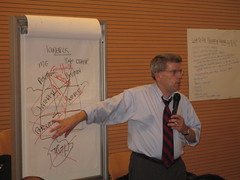 Some refer to it as the act of getting to mutually beneficial agreements, of promoting peaceful settlements or of even preventing the escalation of conflict, damage and lose-lose results. On Monday, June 27, we the IPSI students, had the great pleasure of welcoming Dr. Mark Young and Bjoern Hofmann, who launched a 2,5 days seminar on how to negotiate successfully within an international context.
Some refer to it as the act of getting to mutually beneficial agreements, of promoting peaceful settlements or of even preventing the escalation of conflict, damage and lose-lose results. On Monday, June 27, we the IPSI students, had the great pleasure of welcoming Dr. Mark Young and Bjoern Hofmann, who launched a 2,5 days seminar on how to negotiate successfully within an international context.
The seminar incorporated theory into action and turned action into theory. Practical tools always come hand-in-hand with theoretical frameworks. We were introduced to the dynamics of systems and negotiation per se, to the messages incorporated in negotiation tactics, to objectives and negotiation as a process driven by means as well as ends.
We all participated in a very useful exercise where in coherence with the Prisoner’s Dilemma, we were asked to maximize profit against another player (team of players to be more precise) on the presumption that we could only go about this in three different ways: to cooperate (Red), to not cooperate (Blue) and to do both. For all our independent readers, Red and Blue stand for the choice of color you were asked to go for, per round in a total of 10 rounds. A la Prisoner’s Dilemma, your choosing Red when your competitor has chosen Blue results in his gain and your loss and vice versa. By the same token, your choosing Red and Red would result in maximizing profit but for that to happen, it would require for you to trust each other.
 How do you go about this sort of dilemmas? Do you entrust position on the assumption that the other side will also be cooperative? Do you signal intentions in the hopes that your message will be interpreted correctly? Do you show right from the start that you won’t be a soft negotiator?
How do you go about this sort of dilemmas? Do you entrust position on the assumption that the other side will also be cooperative? Do you signal intentions in the hopes that your message will be interpreted correctly? Do you show right from the start that you won’t be a soft negotiator?
I walked out of class knowing that negotiation is an opportunity. An opportunity to create value, to build long-lasting relationships or to ruin existing ones, to ameliorate or worsen your position, to lose track of time and purpose or to find it because you‘re being put on the spot, to focus or refocus, to discover that perhaps what you walked in with in terms of demands, is not in fact the best you can do or to recognize and respect that we all define truth very differently but so what? Negotiation by default starts off of the prerequisite of us exiting our comfort zone even for a little bit in order to try and take into consideration the needs, concerns, fears and even hopes of the other party. It’s a dance, to use Dr. Young’s analogy, and although sometimes both dancers are equally experienced and therefore produce an amazingly harmonious result together, some other times one is more experienced than the other, in which case he either chooses to drag his partner along or to guide him through. Negotiation is a choice. Every single step, every single minute during which it was taken, every maneuver, every leap of hope or aggressive setback, it’s all a choice- a choice with a direction in mind, a choice with a target and a choice full of content and hidden meaning. Pay attention to the details- the dresses, the rhythm, the background, the audience, the said and unsaid nuances. And then choose, not to defend your truth but perhaps to redefine it in ways you never thought existed.
 As for my favorite Dr. Mark Young moments-
As for my favorite Dr. Mark Young moments-
“Question your assumptions.”
“Logic is not persuasive.”
“Make the pie bigger.”
“Ask questions.”
“Knowledge is power.”
“It doesn’t matter who is right or wrong. Negotiation is about interest not truth.”
“Listen twice as much as you talk.”
“It’s all in the preparation- never, ever ever walk into a negotiation unprepared.”
“If you don’t believe it, they won’t either.”z
It’s been a great two and a half days. Am I a better negotiator after it? Probably not.
But because of it, I will probably be a much more prepared one.
After all, there are no road maps on how to be anything in life, and because there are no road maps, we shouldn’t try to dance better than everyone else in the room. All we have to do is to try and dance better than ourselves. That’s truly the essence of growing (ourselves as well as the pie)- we have to believe it to become it. We have to look inside ourselves for the answers. They are almost always rooted there.
Ourania Dionysiou, Cyprus

